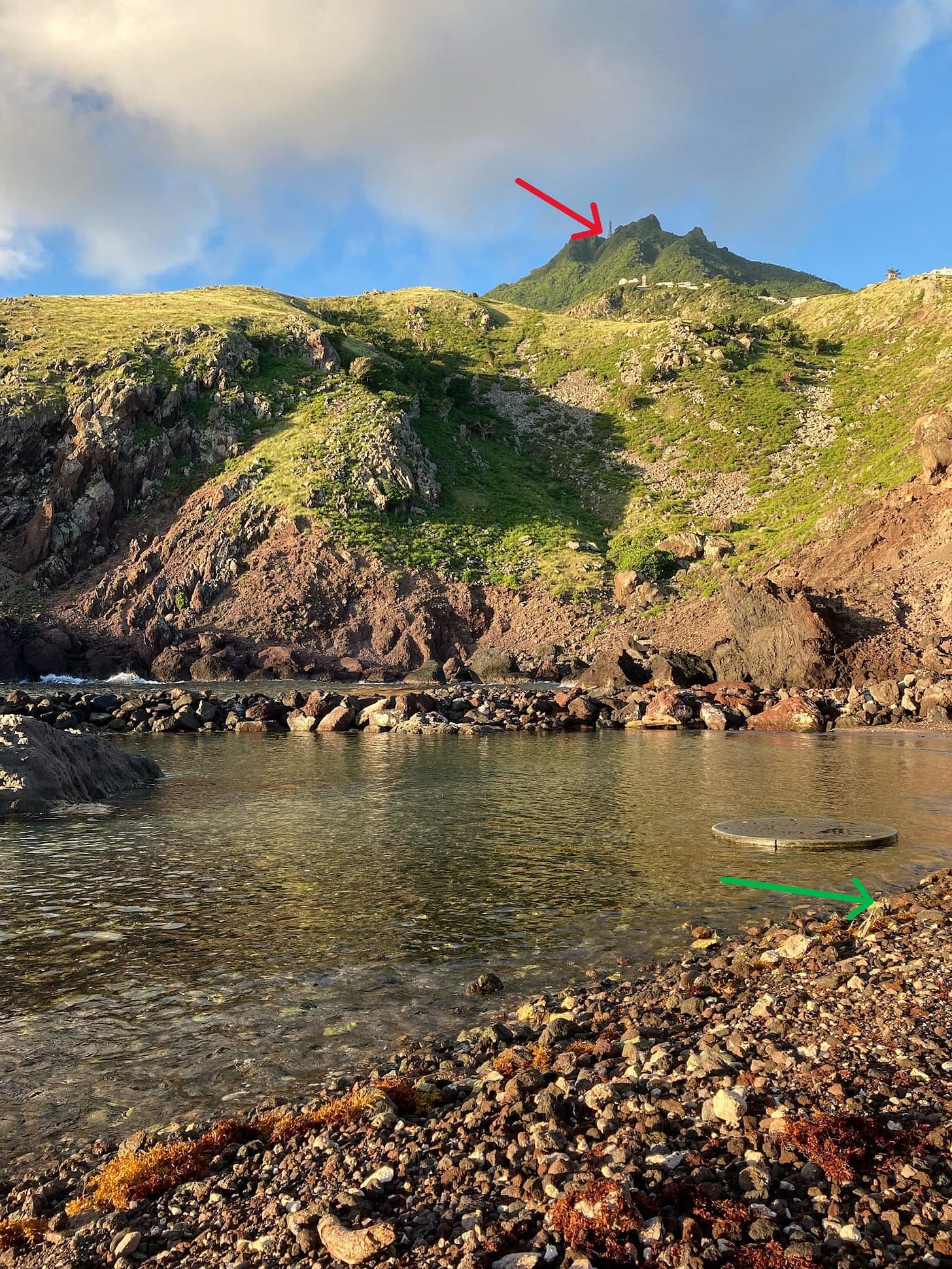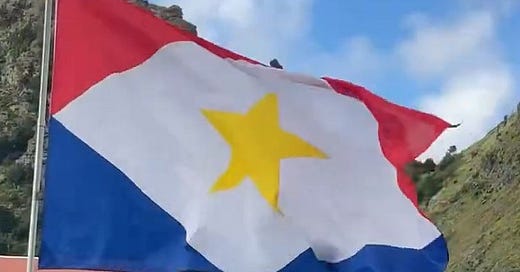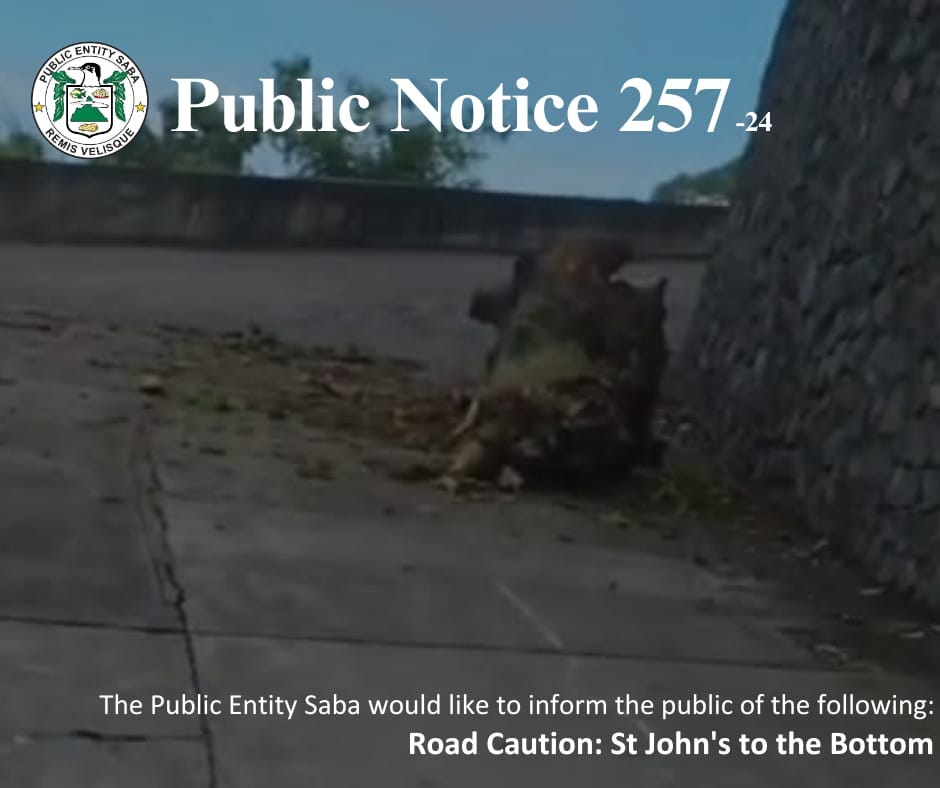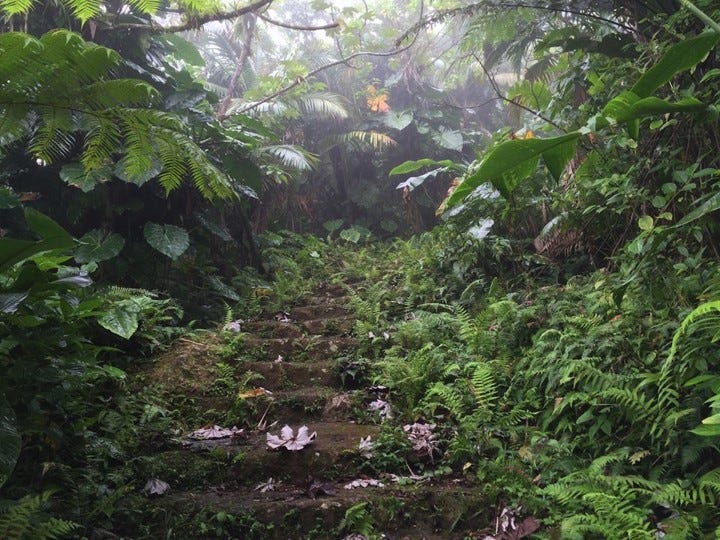Friday was Saba Day, our annual holiday to celebrate our island. There was a church service, followed by the raising of the flag and the singing of the national anthem, followed by speeches, poems, and awards. At the end of this ceremony, all in attendance got a plastic cup of champagne and were led in a toast to Saba by Governor Jonathan Johnson, just like every year.
My favorite part of the festivities is the community awards. In previous years, awardees have included elementary school teachers, electric company employees, and a long-serving volunteer church organist. This year, awards were given to construction workers who help maintain our main road, the road that couldn’t be built1. I don’t think I’ve lived in a place before that reserves top honors for kindergarten teachers and construction workers. To be honest, I don’t think I’ve ever before lived in a place that treated construction workers and kindergarten teachers as much more than anonymous, identical, interchangeable cogs. But on Saba, repairing damage from rockslides and teaching kids how to fingerpaint is something for everyone to celebrate.
Saba, I love you.
The day after Saba day there is a wahoo fishing tournament and a race from the shoreline near the airport to the top of Mount Scenery, the highest point in the Kingdom of the Netherlands. I had….not my worst time in the five times that I’ve run this race.

As we were running along the road, a taxi driver slowed down and rolled down his window to shout encouragement at us. “Saba, I love you!” he said. In addition to driving a taxi, he’s the author of a locally very popular dancehall ditty by the same name. So I shouted back the next line: “I really, really love you!”2 Because how can I not?
Here are some of the things I love about Saba: the red roofs, the blue ocean, the green hills, and all the unique plants and animals that live there. The ridiculous sporting events like the Sea to Scenery race and the fact that so many people, year after year, sign up to participate or to organize them. The fact that so many people just volunteer in general, like in island-wide cleanups or public health campaigns. The parties where everyone is welcome. The children hitchhiking. Knowing everyone, at least well enough to recognize their face and to care about the mellee about them. Knowing that they know you well enough to gossip about you, too.
I understand that not everyone might be excited about being known, and gossiped about, by others. There are other things I love about Saba that I think other people may not:
I love the absence of self-checkout stands at the stores, and that the cashier will not allow me to carry my groceries back to my car on my own. I love that my car, like most cars on Saba, is covered with dents so common there’s an affectionate term for them: “Saba kisses.” I love that stores are closed on Sunday, and on a lot of holidays that I forget about until I can’t go shopping that day. I love that there’s at least a two-week delay between when you order something online and when you can expect to receive it on Saba. I love that you can’t always buy all the things you want at the store. I love having to cook with fruits and vegetables I wasn’t familiar with until I moved here. I love it that if you need a home repair you do it on your own or ask a friend to help, and if they can’t you ask if they can recommend someone who can, instead of consulting Yelp reviews. I love relying on cistern water, and all that implies about frugality, appreciation for weather, and gratitude for rain.
I love the inconvenience of living here. I love that here I cannot avoid noticing all the particular details that make Saba special. I love the specific granularity I am forced to notice, to be grateful for because there are bumps in my way.
Global capitalism seeks to give consumers a frictionless purchasing experience. This means that there aren’t any bumps or hiccups with buying something. Smart appliances in the “internet of things,” I understand, will just order more laundry detergent or what have you for you before you run out. You don’t have to think about it. (Needless to say, the internet of things is not a thing here.) Something that facilitates this frictionless shopping experience is the smoothing out of differences, that everything is the same.
I am jarred by this sameness when I visit the United States, the land of my birth. The chain restaurants have identical menus, decor, and uniforms for the servers you are also nudged into thinking of as interchangeable cogs no matter what city you visit. The glossy grocery stores always have every ingredient you could conceivably want, packaged so that you’re never confronted with anything you don’t. It’s slick and smooth from Boulder to Birmingham, distinguishing features ground down by design.
I understand how one could like this convenience, even be delighted by it at first, like a magic trick. I understand how the certainty about expectations granted by sameness could be calming, and why people might choose it for that reason. But I do not understand how anyone could love it.
The next time I go to the United States, I do not want to go to a chain restaurant3, identical in every American city. I want to go to Max’s, the mom-and-pop diner down the street from where my parents’ business used to be.
“Oh, honey, Max’s closed,” my mother tells me.
The forces working to grind down the idiosyncrasies of particular, bumpy American locales do not stop at the US border. They are insatiable, and do not intend to stop until the whole world is smooth as glass. Frictionless.
Saba is not immune. Tourists complain about the lack of touchless payments, and at least a few local businesses have acquiesced, even though accepting credit cards actively costs those businesses money, and threatens to collapse a mutually-beneficial cash-based system4, to the benefit of no one but the rentiers at American Express. One restaurant now makes it menus available exclusively via QR code. Some stores are now open on Sunday.
A parade of short-term Dutch consultants offer suggestions, and then commands, for how to modernize Saba. Trendy American and European cultural values are first imported and then enforced. The rock in the road, the thing that stops Saba from being paved into the uniformity enveloping so much of the world is its inconvenience.
Saba, I love you.
I am starting to feel a bit like the cranky host on the local radio station, bemoaning what has been, afraid for the future.
I used to work in radio, too. I worked in radio when Jacor gobbled up Noble broadcasting, and when it got gobbled up itself by Clear Channel. I saw the time before the Telecommunications Act of 1996, and the time after. Our local station replaced a lot of local radio personalities with syndicated programming. Broadcasts of unique local news events—say, awards ceremonies for elementary teachers—were replaced with uniform national news feeds. Small local bands couldn’t get their music played by local deejays, because the local deejays had disappeared. It became glossy and smooth, the same voices and songs everywhere, no matter where you traveled across the United States. Frictionless.
I stopped working in radio some time after that.
But today on Saba radio the voice of the cab driver chants to a dancehall beat a song that is not and never will be on iTunes, or Spotify, or YouTube:
“Saba, I love you! I really, really love you!”
The second half of the Sea to Scenery race is up a rocky trail. My footing is uncertain; I have to pay attention to every step. It’s beautiful. I am vividly conscious of the beauty because I have to be. If I lose focus, I will fall.
It is not frictionless. It is not expected. It is unique, and surprising. I am more enamored of this island, in all her particular detail, every day.
I pray our spiky, specific paradise is never paved smooth. I pray we remain a place that honors individual construction workers, where we know and care about each other well enough to rumor-monger. I pray that we never fall victim to the antiseptic conformity that seems to have conquered so much of the Western world.
To love something, at minimum, is to know it, and to believe in its specialness. I will try to know this island in more depth, and to preserve what makes her special.
Saba, I love you for your jagged edges, for your mountains and hillsides so steep. I will never forget to be grateful that I have the privilege to call you my home.
A fascinating history of the building of the one road on Saba, complete with historic photos of what transportation on the island looked like prior to the building of the road, was written by local historian Will Johnson at The Saba Islander.
You now know the entirety of the lyrics to this song.
Except KFC. Obviously.
Although Saba is a Dutch municipality, our official currency is the US dollar. For a better understanding of why different places in the Caribbean may choose to use the currency of another country—especially the United States—as their own, I highly recommend
’s series on Caribbean dollarization. Start here: “Notes Towards Caribbean Dollarization (Part 1)” at the very informative Substack of .






This was a delightful read. Saba seems to embody the ethos of what we call "island time". That is, all the inefficiencies and inconveniences that visitors to the region hit head on. Some people see it as a nuisance, others as unique character that forces you to stop and enjoy the culture you are in.
Barbados is a mix of both. The closer you get to the built up tourist coast the more you expect cashless payments etc. But our East Coast has managed to remain mostly immune. There aren't even any ATMs in the eastern parishes.
We kinda pride ourselves on offering both experiences. But with the pandemic ending our capital has regressed. It was dying before but it's accelerating now. The infrastructure is crumbling and the city is a ghost town by 8 PM. There were plans to bring 24/7 commerce to the island but with many different facets of the economy virtually zombified, that will no longer happen.
Do the people of Saba consider themselves Dutch (in a patriotic, nationalist sense), or is it just an administrative thing? Europe's remaining overseas possessions are fascinating to me, their continued existence a strange vestigial reminder of the prewar order.